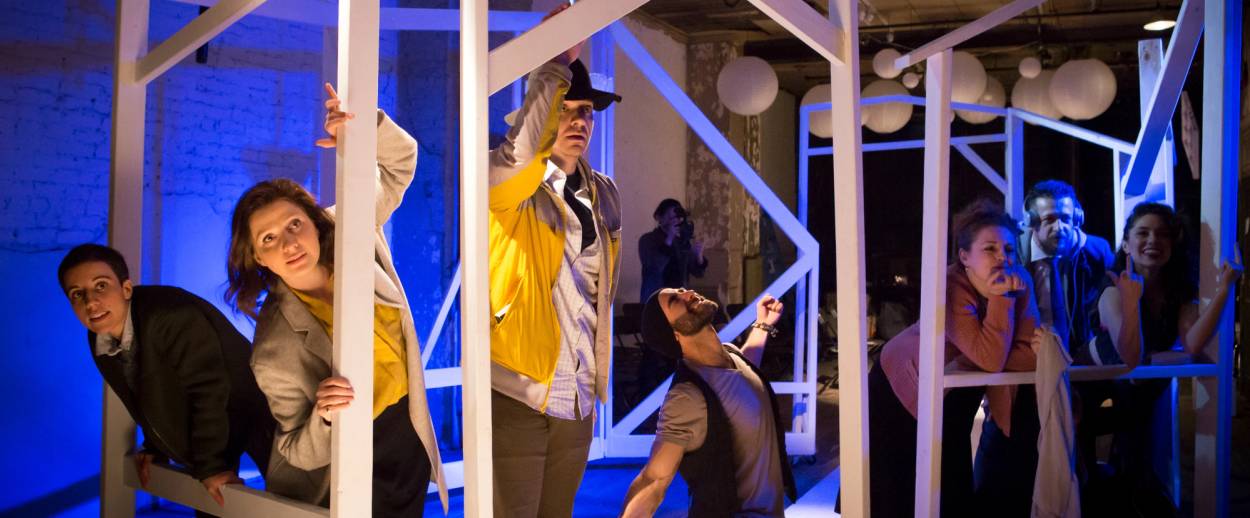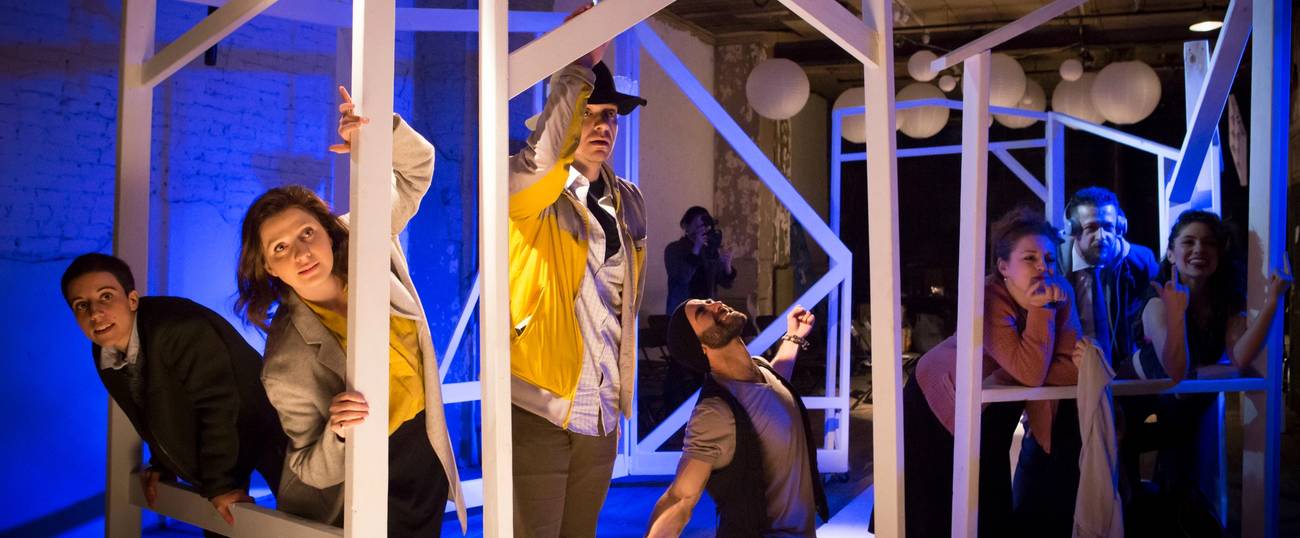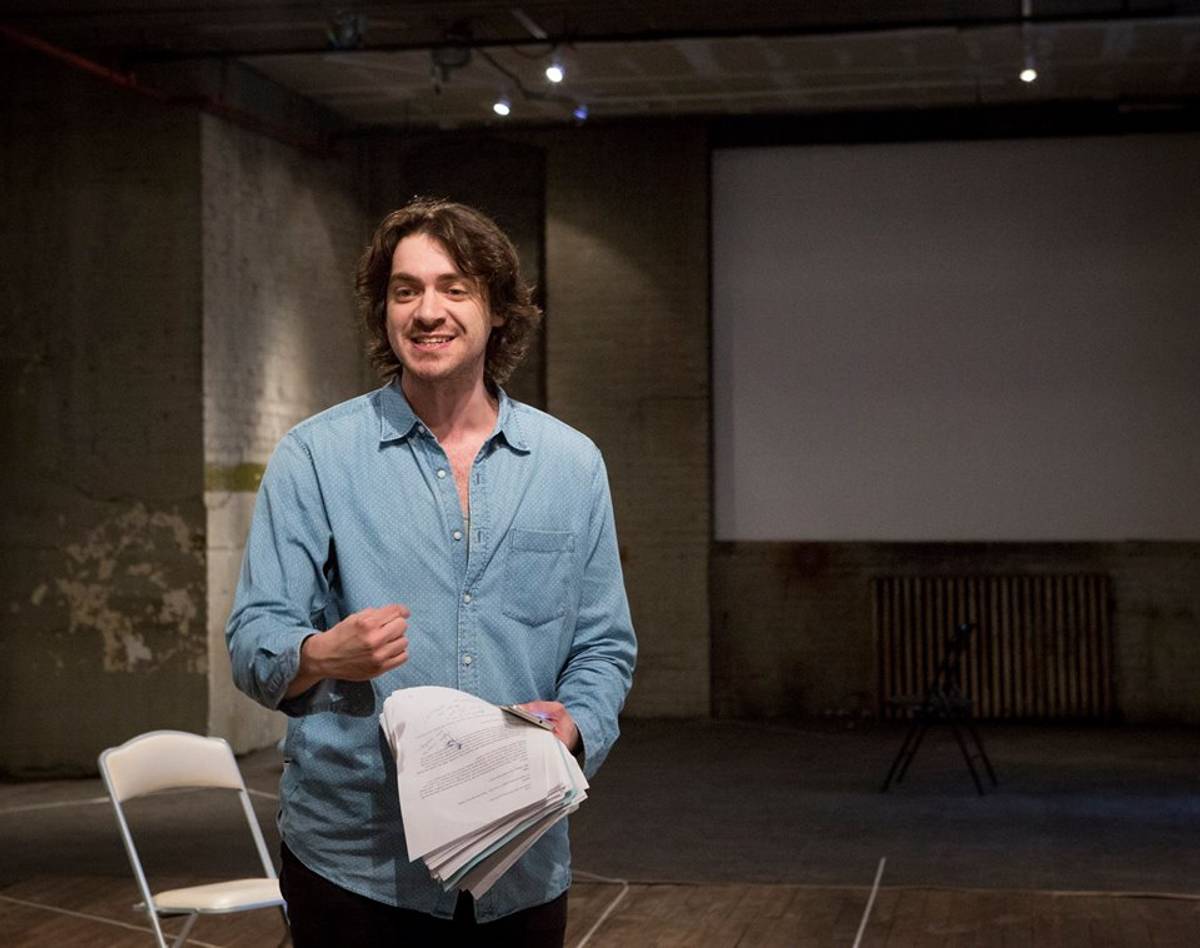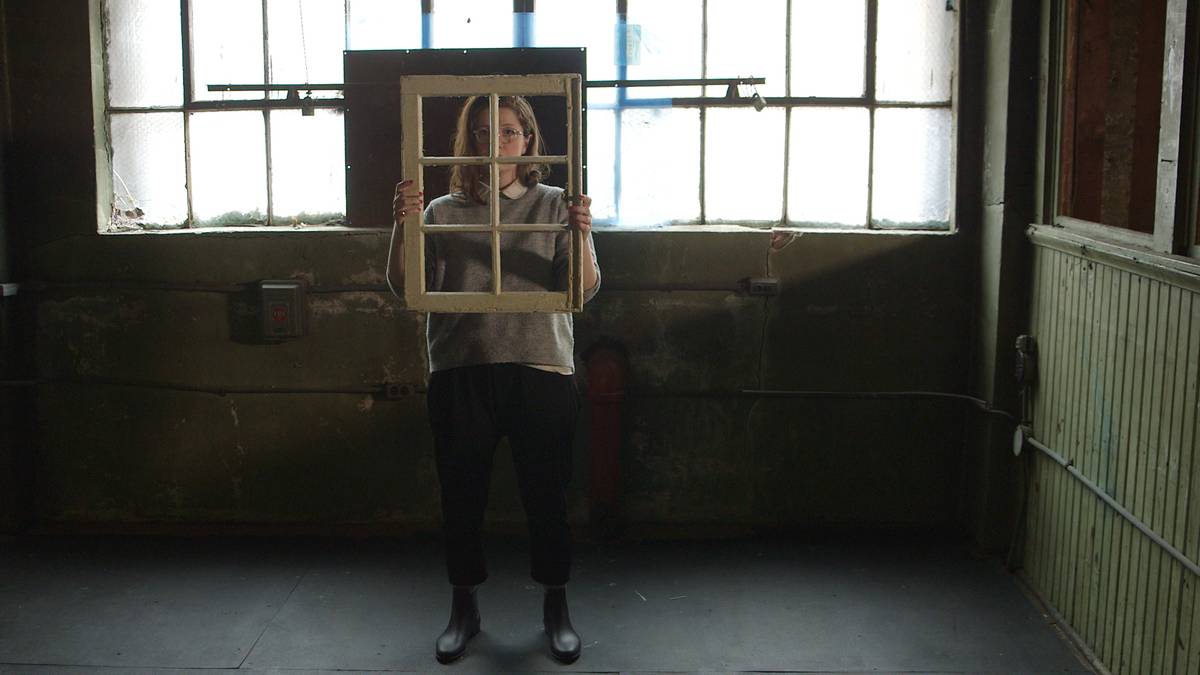Close to Home
The Lost & Found Project, an experimental theater company based in New York City, is making new sense of old Jewish roots




In the part of town where the Upper East Side becomes Harlem, a group of young actors run, skip, and even rollerblade through a warehouse-like theater while live video of their performance streams on a far wall. It’s the meaty, meta stuff of off-off-Broadway, and it’s the latest product from the minds of the collective known as Lost & Found.
The Lost & Found theater company has been active since 2011, and it has been partnering with the National Yiddish Theatre Folksbiene since 2013 (they also function on a grant from the Genesis Philanthropy Group). The company, which primarily stages shows related to the broad Russian-Jewish-American experience, gets its title from their belief that their work is “bridging the lost and the found,” according to founding member Anya Zicer. “We’re being forced to get up and go.”
Of course, many of the company members’ families had to “get up and go” sometime in the last half-century; the troupe is comprised of Jewish artists whose families emigrated during or after the Soviet Union.
“There are different immigrant stories [within] the Russian Jewish immigrant experience,” said founding member and company writer Boris Zilberman. “For the children of Russian Jewish experience, which is what we are, it’s very specific.”

So for Lost & Found, what is lost? History? To an extent, yes, and many members of the company are aware that their families’ long legacies in the Russian-speaking world have ended for good because of factors like anti-Semitism, which pulled them from their homes and eroded their communities, but the “found” is never simple. As their work constantly explores, loss can be waiting around the corner. Discovery can lie in the past. Certainly, company members bristle at assumptions that their Jewish identity was lost in the Soviet Union, and now is found through the United States, or that their struggles are interchangeable with whichever immigrant group is currently in the news.
Take their newest play, Old New Year. Its title comes from a quirk of culture that has led to a puzzle of Jews celebrating a holiday several times removed: Because the Soviet Union all but banned religion, Christmas traditions moved to the celebration of the Russian New Year. But the Russian Orthodox Church runs on the Julian calendar, and its New Year used to fall a couple of weeks into the year. Hence the “old new year,” a Russian celebration joining Christmas traditions with Soviet-friendly New Year festivities, occurring through when the new year used to fall. And because everything was so secularized, Jews adopted all of these customs. The result? Modern Russian Jews, even in America, have trees in their homes in the holiday season, but it doesn’t denote assimilation or Christmas envy like American Jews with a “Hanukkah bush”… it just means you’re Russian.
And so, Old New Year, set in present-day New York City, is almost entirely in English, but with smatterings of Russian and other languages. It is an ensemble piece about a diverse group of Russian Jews in one neighborhood, as they play out their struggles mundane and profound in what the play calls “the lab of happiness.” The cast of characters are all secular; some of them don’t even explicitly reference being Jewish. But their Jewishness, and their Russian-ness, punctuate their struggles. Take the husband who wants to start a family, wanting to give his un-conceived son the bris he never had, or the running theme of the works of author Bruno Schulz (he died in Poland, in the Holocaust).
Old New Year, like most of Lost & Found’s work, is devised documentary, as in, it begins with found-text (in this case, mainly interviews) and is then tweaked and worked by the company from there. Zilberman is the main writer and the director is Gera Sandler; both of them are in the cast, too.
The jumping off point for this play was what brings a person to New York, and what makes them stay, questions that have a million different answers. Cast members similarly contain multitudes. Offstage, some company members easily switch back and forth between Russian and English in conversation. They may call each other different names depending on their relationship and different cultural contexts.
Take Zicer, who was born in Russia and raised in Israel to a theatrical family that had close ties with the family of Russian Yiddish theater giant Solomon Mikhoels. She’s a fairly recent immigrant to the States compared to, say, Zilberman, who was born in Ukraine and has been in this country since he was 6. Each company member has a unique story, despite their common heritage. When the company faces the larger Jewish world, it can be a step back in time, and they’re often othered as “The Russians” or “The immigrants,” asked what makes their work Jewish, and viewed almost with skepticism, or paternalism. But ask any Jewish person to extricate their ethnicity from the rest of their work, and you’re missing the point.
“We view our Jewishness through literature, arts, and theater,” said Zicer simply.

Over the last six years, the company has become like a family, watching apartments, jobs, significant others, come and go. “I wanted to have more a community of actors that are not just actors, but are advocates and people who really wanted to explore that through theater,” said Zicer. Old New Year highlights a lot of what they’ve gone through coming of age together.
“What’s Jewish about this play? For me, the most Jewish thing is this concept of always being kind of nomadic if not in physical motion, than in spirit,” said Zilberman. Characters strive “to get back to something that they once knew, or to go forward to something that they think is there.”
While Lost & Found has only staged a handful of original, full-length plays, they’re constantly consumed by a diverse range of other projects. There are community-building initiatives like their Teen Drama Lab, where they help young people explore their identity through theater. There’s the likes of “Shabbat in the Dark,” an experimental evening where audience members are blindfolded as they listen to music and eat a Sabbath meal (catered by Gefilteria) that told the story of creation—in reverse. (As in—the course for the fifth day was a fish crostini, but it was dessert that corresponded with “Let there be light.”) Shabbat in Judaism is known as an “island in time,” independent of the past or the present, but Lost & Found managed to send even that flowing backwards.
Lost & Found has even tried radio drama, with their podcast Shayna, an audio play about a Russian-American-Jewish young musician who fears she is literally being haunted by the past. Meanwhile, with a sick mother, she fears that time is also running out. Musical, and very Yiddish, it’s a gripping listen.
“What am I doing with the time that I have here? I think that’s intrinsic in the work,” says Zilberman. (Fortunately, while live theater is transitory, podcasts are forever.)
Characters in Old New Year seem paralyzed. There’s the woman who won’t divorce her separated husband of ten years, and the artist who mourns her teenage love fifteen years later. What might they lose if they move? What might they find?
The crux of Lost & Found’s work is not an exploration of what it means to be Jewish, or to be Russian, or to be American. It’s an exploration of identity, and its whole mess of contradictions. That, and its local, grassroots feel is why the company’s audiences are more diverse than a lot of mainstream theaters.
Old New Year runs through May 13. After that, who knows? Maybe another podcast, and certainly another play down the line. Zicer considers the company an experiment that is now something bigger, something distinct, and Zilberman is excitedly looking forward.
“There’s no back,” he said. “We’re here and we have to do whatever we’re going to do here. Our generation is not immigrants anymore. We are full on Americans.”
Old New Year runs at 345 E. 104th St. through May 13. Tickets here.
Gabriela Geselowitz is a writer and the former editor of Jewcy.com.